6 Beautiful Pollinator Container-Garden Designs
Fill your pots with plants that hummingbirds and beneficial insects love

Over the last few decades, gardeners and the general public have become increasingly aware of the importance of supporting pollinators. These hardworking creatures are under threat due to habitat loss and widespread use of pesticides, and they could use help from wherever they can get it. Fortunately, if you have room for a few potted plants, you can be part of the solution. Choosing container plants that attract and feed winged wildlife is an easy and enjoyable way to get to know your local pollinators. For inspiration, check out the pollinator container garden ideas below, which were designed with our nectar- and pollen-loving friends in mind.
Grow a Miniature Meadow Container Garden

Having a meadow garden doesn’t necessarily mean ripping out your front lawn. It can be as simple as filling a few containers with a breezy, colorful combination like this. A seed mix designed to attract and feed bees adds extra variety and interest to this plant palette, and sweet alyssum ensures a reliable supply of nectar from spring through frost.
Pollinator power plant: Sweet alyssum
The shallow, sweetly fragrant, nectar-rich blooms of sweet alyssum (#3) attract a wide array of pollinators, including bees, flower flies, parasitic wasps, and butterflies.
Other plants in this design
- ‘Bee Feed Mix’ flower seed assortment (Johnny’s Selected Seed)
- Truffula™ Pink globe amaranth (Gomphrena pulchella ‘PAST0517E’, Zones 9–11)
- ‘Wonderland Mix’ sweet alyssum (Lobularia maritima* ‘Wonderland Mix’, annual)
- ‘Snowland’ creeping daisy (Leucanthemum paludosum ‘Snowland’, annual)
- ‘Happy Ring’ cosmos (Cosmos bipinnatus ‘Happy Ring’, annual)
- Stratosphere™ White gaura (Gaura lindheimeri ‘Gautalwi’, Zones 5–9)
A Container Design That Is a Nectar Haven for Hummingbirds and Butterflies
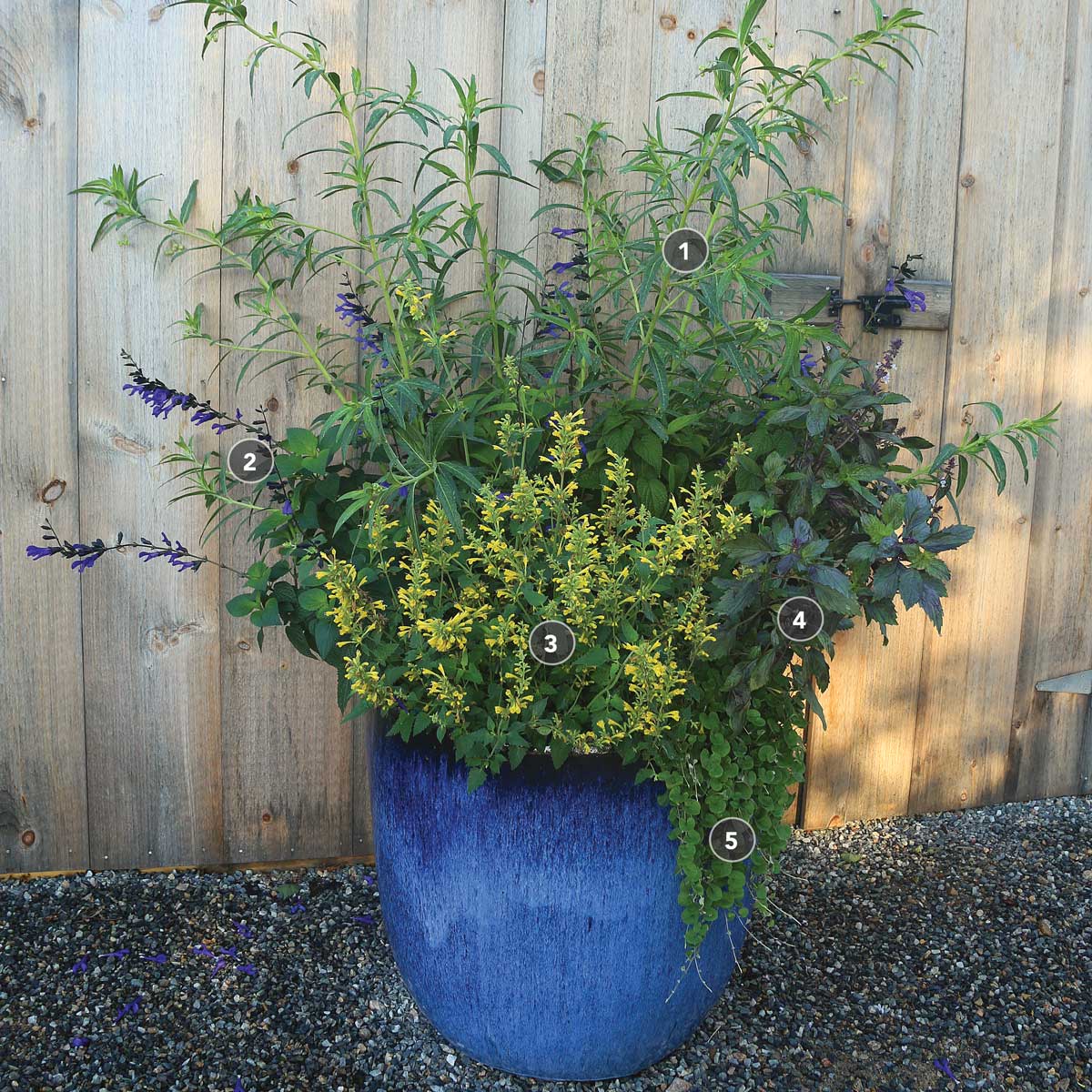
The vivid flowers of sage and agastache will catch the eye of passing hummers and a host of other pollinators, and you will enjoy the long-lasting displays these plants provide. Balloon plant, part of the milkweed family, is a host for monarch butterfly larvae, and its subtle white flowers are also a rich nectar source.
Pollinator power plant: ‘Black and Blue’ anise-scented sage
‘Black and Blue’ anise-scented sage (#2) is a hummingbird magnet, and larger butterflies also enjoy visiting its deep-throated flowers.
Other plants in this container design
- Balloon plant (Gomphocarpus physocarpus, Zones 8–10)
- ‘Black and Blue’ anise-scented sage (Salvia guaranitica ‘Black and Blue’, Zones 7–10)
- ‘Kudos Yellow’ agastache (Agastache ‘Kudos Yellow’, Zones 5–9)
- ‘Aromatto’ basil (Ocimum basilicum ‘Aromatto’, annual)
- ‘Emerald Falls’ dichondra (Dichondra repens ‘Emerald Falls’, Zones 7–11)
A Pollinator Pot Design That Will Bloom All Season

Black-eyed Susan vine is a favorite of butterflies, hummingbirds, and bees. Given full sun, fertile soil, and a trellis to support it, this twining climber can cover itself in blooms from late spring through frost. Tuck in more nectar producers around its feet to add to the bounty.
Pollinator power plant: Black-eyed Susan vine
The flowers of black-eyed Susan vine (#1) have ultraviolet markings called nectar guides that butterflies and bees use to locate nectar.
Other plants in this container design
- ‘Arizona Glow’ black-eyed Susan vine (Thunbergia alata ‘Arizona Glow’, Zones 9–11)
- ‘Toffee Twist’ sedge (Carex flagellifera ‘Toffee Twist’, Zones 7–10)
- ‘Guacamole’ Swedish ivy (Plectranthus ‘Guacamole’, Zones 8–11)
- ‘Silky Gold’ Mexican butterfly weed (Asclepias curassavica ‘Silky Gold’, Zones 8–11)
A Container Design That Acts as a Caterpillar Nursery

Monarch butterflies are beloved garden visitors, and it is especially gratifying to watch their young grow and metamorphose. Swamp milkweed is an excellent host plant for monarch larvae, and by adding some other nectar-rich plants to the mix, you can make this real-estate offering even more inviting for monarch mothers.
Pollinator power plant: Rock hyssop
The abundant midsummer blooms of rock hyssop (#1) attract bees of all kinds, butterflies, and hummingbirds.
Other plants in this container design
- Rock hyssop (Hyssopus officinalis subsp. aristatus, Zones 4–9)
- ‘Ice Ballet’ swamp milkweed (Asclepias incarnata ‘Ice Ballet’, Zones 3–9)
- Japanese aralia (Fatsia japonica, Zones 8–10)
- Blue throatwort (Trachelium caeruleum, Zones 9–11)
- ‘Amethyst’ basil (Ocimum basilicum ‘Amethyst’, annual)
A Pollinator-Friendly Window Flower Box

A large window box opens up a world of possibilities for gardeners with limited space. Imagine viewing the pollinators’ aerobatics from the comfort of your kitchen window or a favorite armchair. Butterflies and hummingbirds will be especially pleased with a tasty assortment of tubular flowers like those shown here.
Pollinator power plant: Meteor Shower® verbena
Meteor Shower® verbena (#1) grows just a few feet tall and will keep butterflies and bees happy from early summer until hard frost.
Other plants in this container design
- Meteor Shower® verbena (Verbena bonariensis ‘INVEBPUTOW’, Zones 7–11)
- ‘Silky Gold’ Mexican butterfly weed (Asclepias curassavica ‘Silky Gold’, Zones 8–11)
- Mexican butterfly weed (Asclepias curassavica, Zones 8–11)
- ‘Purple Queen’ purple heart (Tradescantia pallida ‘Purple Queen’, Zones 8–11)
- Dreamsicle® trailing petunia (Calibrachoa ‘INCALDRSIM’, annual)
- Bat-faced cuphea (Cuphea llavea, Zones 9–11)
- ‘Gold Capella’ dwarf umbrella tree (Schefflera arboricola ‘Gold Capella’, Zones 10–11)
- Golden creeping Jenny (Lysimachia nummularia* ‘Aurea’, Zones 3–10)
A Container Design That Acts as a Treasure Trove for Pollinators
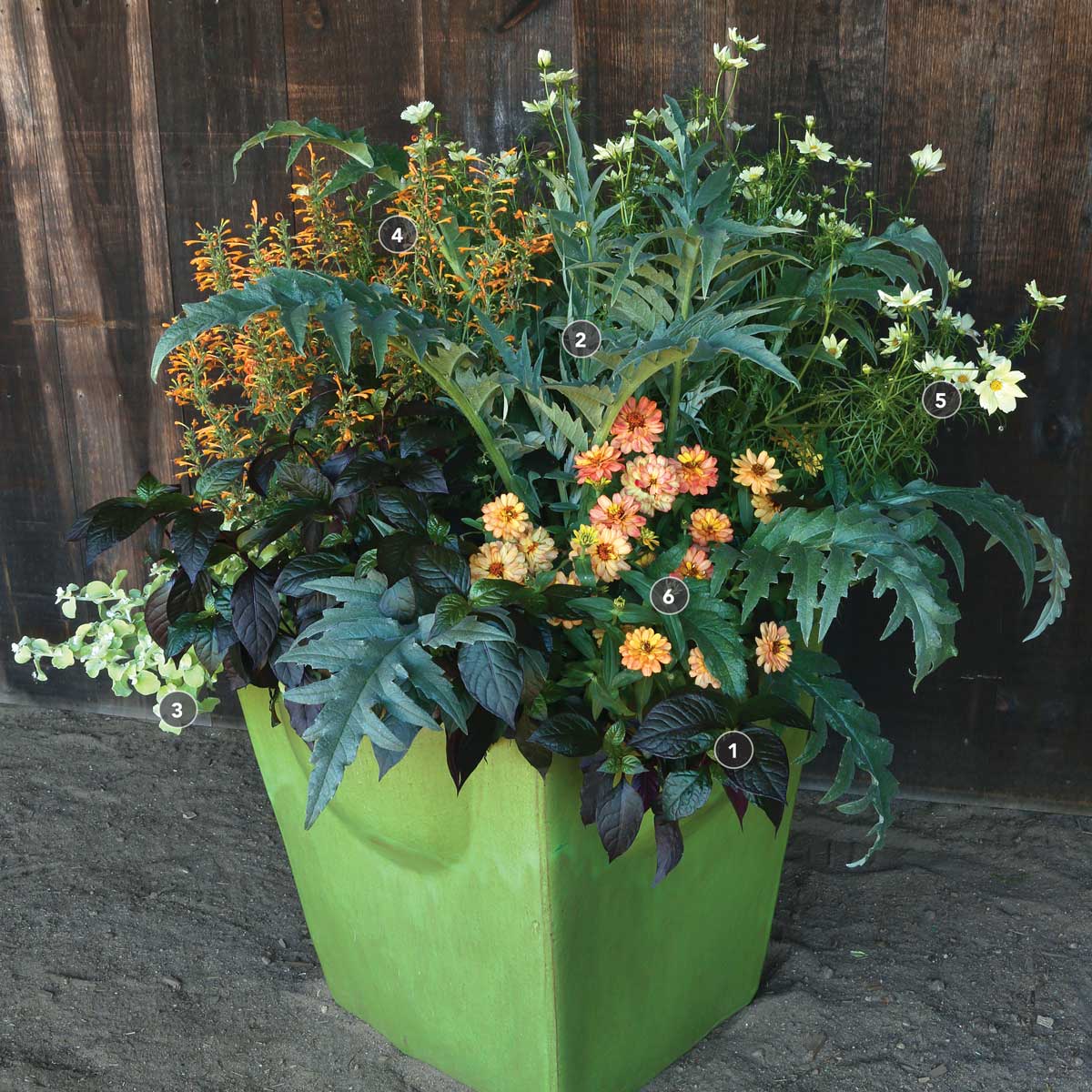
Cosmos, zinnias, and agastache are all excellent sources of nectar and pollen. By combining compact varieties of these vigorous bloomers with lush foliage plants such as cardoon, calico plant, and licorice plant, you can create a miniature landscape that encourages winged visitors to land and linger a while.
- ‘Purple Knight’ calico plant (Alternanthera dentata ‘Purple Knight’, annual)
- Cardoon (Cynara cardunculus*, Zones 7–10)
- ‘Limelight’ licorice plant (Helichrysum petiolare ‘Limelight’, Zones 9–11)
- ‘Kudos Mandarin’ agastache (Agastache ‘Kudos Mandarin’, Zones 5–9)
- ‘Xanthos’ cosmos (Cosmos bipinnatus ‘Xanthos’, annual)
- ‘Profusion Double Deep Salmon’ zinnia (Zinnia ‘Profusion Double Deep Salmon’, annual)
Sarah Partyka is the owner of The Farmer’s Daughter, a garden center in South Kingstown, Rhode Island.
Fine Gardening Recommended Products
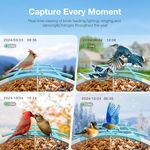
isYoung Birdlook® Smart Bird Feeder with Camera
Fine Gardening receives a commission for items purchased through links on this site, including Amazon Associates and other affiliate advertising programs.
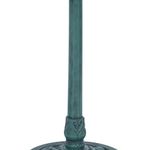
Alpine Corporation 28" Tall Outdoor Birdbath with Scrollwork Decoration Yard Statue
Fine Gardening receives a commission for items purchased through links on this site, including Amazon Associates and other affiliate advertising programs.
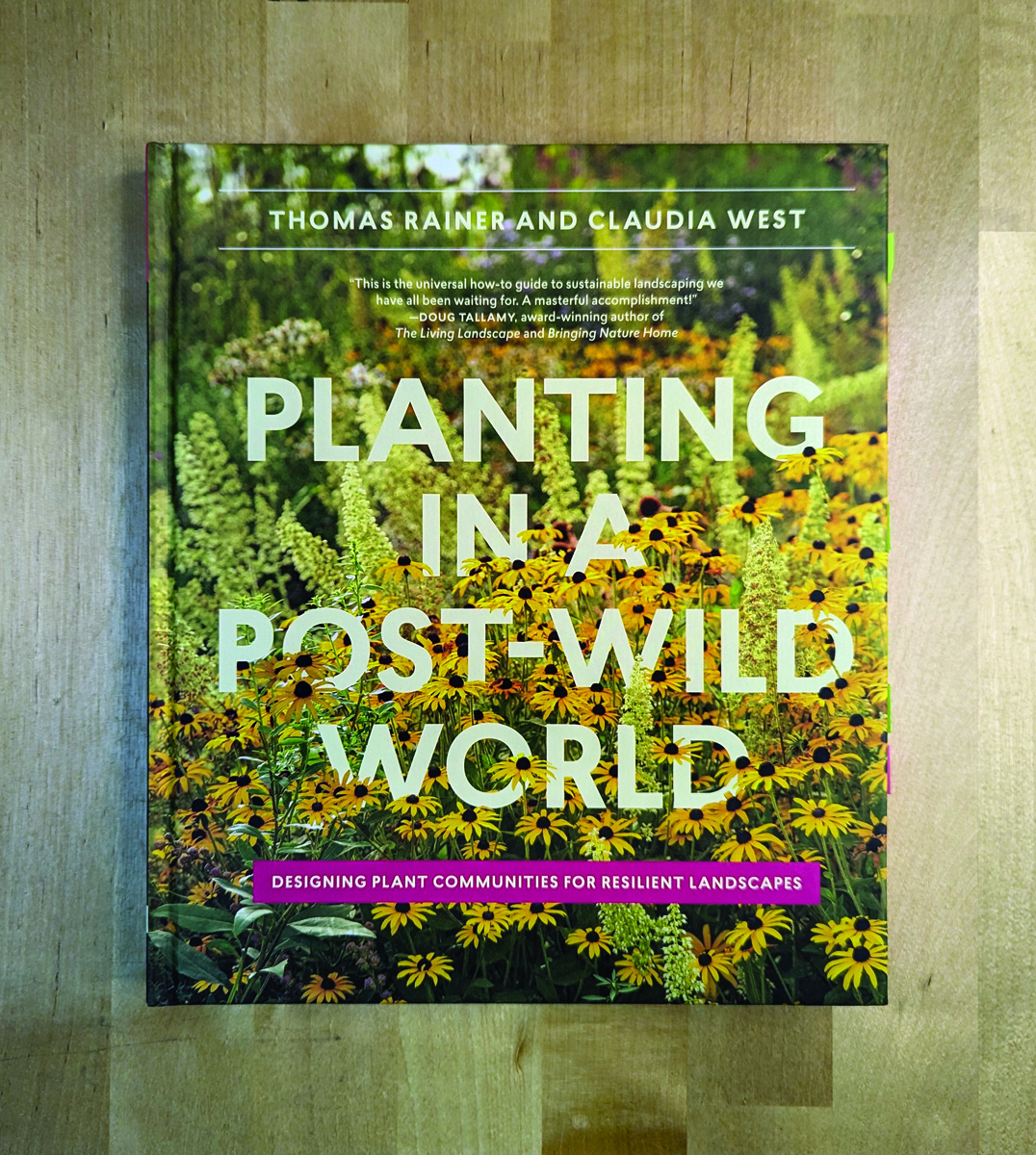
Planting in a Post-Wild World: Designing Plant Communities for Resilient Landscapes
Fine Gardening receives a commission for items purchased through links on this site, including Amazon Associates and other affiliate advertising programs.

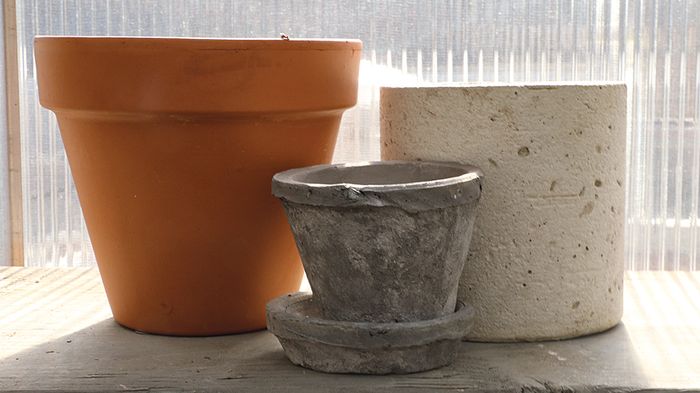





Comments
Cool scientific and esthetic design!
Beautiful useful ideas! Best I’ve seen and something we all can do! I’ll share with my garden club
Log in or create an account to post a comment.
Sign up Log in